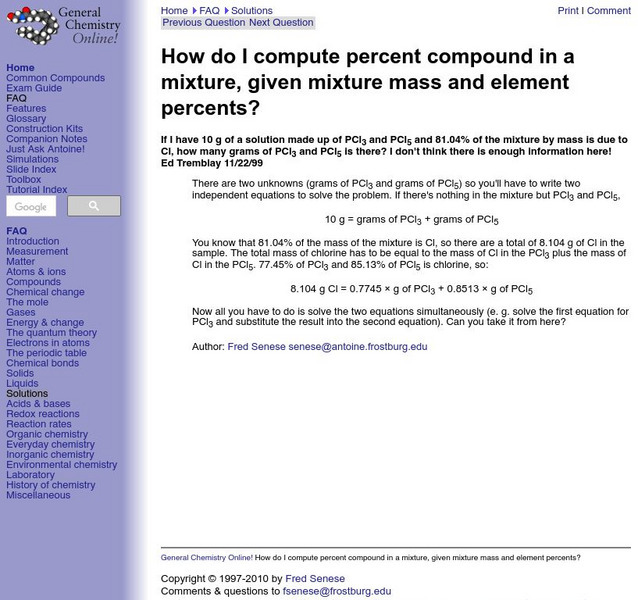Hi, what do you want to do?
Physics Aviary
Physics Aviary: Practice Problems: Walk the Planck
Determine the amount of mass that you must place on a plank to allow you to walk to the end of the plank without cause it to rotate off the ship. An accompanying video explains the problem: https://youtu.be/1dFQL45hlkc
Physics Aviary
Physics Aviary: Practice Problems: Dump Tower Level 4
Students will try to determine the mass of a planet based on the falling of an object from the top of a garish tower.
CPALMS
Florida State University Cpalms: Florida Students: Classifying & Comparing Physical Properties
Explore and compare physical properties of substances.
Physics Classroom
The Physics Classroom: Newton's Second Law of Motion
Learn more about finding acceleration through the practices found in this lesson. "The process of determining the acceleration of an object demands that the mass and the net force are known." Check out this comprehensive site.
Physics Classroom
The Physics Classroom: Newton's Laws: Drawing Free Body Diagrams
Students practice reading situations where forces are acting upon objects in all directions and magnitudes, and then draw free-body diagrams to represent the forces. Each problem has a self-checking key linked right on the page.
Physics Classroom
The Physics Classroom: Newton's Laws: Finding Acceleration
This physics tutorial provides students some practice using a given equation to find the acceleration of an object.
Physics Classroom
The Physics Classroom: Momentum and Its Conservation: Momentum
Through examples and interactive practice problems, students explore the momentum equation.
Physics Classroom
The Physics Classroom: Momentum and Its Conservation: Real World Applications
In this interactive physics tutorial, students examine some real-world applications of the impulse-momentum change theorem, more specifically, some physics in action in the real world.
Science Struck
Science Struck: Triple Beam Balance: Function, Parts, and Uses
Explains what a triple beam balance does, how it is constructed, and how it functions.
CK-12 Foundation
Ck 12: Physics Simulation: Bumper Cars
[Free Registration/Login Required] Learn about the effect of mass and velocity on force by playing a simulation involving bumper cars. A PDF worksheet and a video tutorial are also available.
Physics Aviary
Physics Aviary: Force Gravity Bucket Lab
This lab was designed to allow students to collect data for the Force Gravity vs. Volume lab for materials and locations that we cannot do in the classroom. Students will fill the bucket to different levels and record the force on the...
Physics Aviary
Physics Aviary: Practice Problems: Motion on Incline Level 1
Students must calculate the distance an object will move up an incline using Newton's Laws. Mass, angle, gravitational field and initial speed will be generated randomly.
Physics Aviary
Physics Aviary: Practice Problems: Motion on Incline Level 2
Students must calculate the distance an object will move up an incline using Newton's Laws. Mass, angle, gravitational field, coefficient of friction and initial speed will be generated randomly.
Physics Aviary
Physics Aviary: Practice Problems: Motion on Incline Level 3
Students must calculate the speed of a block when it returns to its original location on an incline using Newton's Laws. Mass, angle, gravitational field, coefficient of friction and initial speed will be generated randomly.
Physics Aviary
Physics Aviary: Practice Problems: Spring Constant From Force Data
Students must find the value of the spring constant and the original length of a spring based on data that was collected from stretching a spring different amounts using a force probe.
Physics Aviary
Physics Aviary: Practice Problems: Spring Constant From Data
Students must find the value of the spring constant and the original length of a spring based on data that was collected from hanging different masses on the end of a vertical spring.
Physics Aviary
Physics Aviary: Practice Problems: Spring Constant Problem
Students must find the value of the spring constant based on direct measurements of length.
Physics Aviary
Physics Aviary: Practice Problems: Acceleration on Incline Problem Medium
Students must calculate the acceleration of an object down an incline when there is friction present. Mass, angle and coefficient of friction will be generated randomly.
Exploratorium
Exploratorium: Your Weight on Other Worlds
Ever wonder what you might weigh on other planets? Here's your chance to find out.
BBC
Bbc: Gcse Bitesize: Newton's Second Law
This lesson focuses on Newton's Second Law including the formula Force = mass to the x power acceleration, an example of how to calculate the force needed to accelerate based on mass, and a link to a test.
Khan Academy
Khan Academy: Estimating Mass
In this exercise, students practice estimating mass. Students receive immediate feedback and have the opportunity to get step-by-step hints and try questions repeatedly. CCSS.Math.Content.3.MD.A.2 Measure and estimate liquid volumes and...
Khan Academy
Khan Academy: Word Problems With Mass
In this exercise, students practice arithmetic word problems with mass. Students receive immediate feedback and have the opportunity to get hints, watch a tutorial video, and try questions repeatedly. CCSS.Math.Content.3.MD.A.2 Measure...
Frostburg State University
General Chemistry: Percent Compound in a Mixture
Resource contains and example problem and solution of how to compute percent compound within a mixture when given the mixture's mass and element percents.
Illustrative Mathematics
Illustrative Mathematics: G Mg a Ton of Snow
In this task, students are asked to find out how much snow has been shoveled using the concepts of area, depth, density, and rate. Aligns with HSG-MG.A.2.












